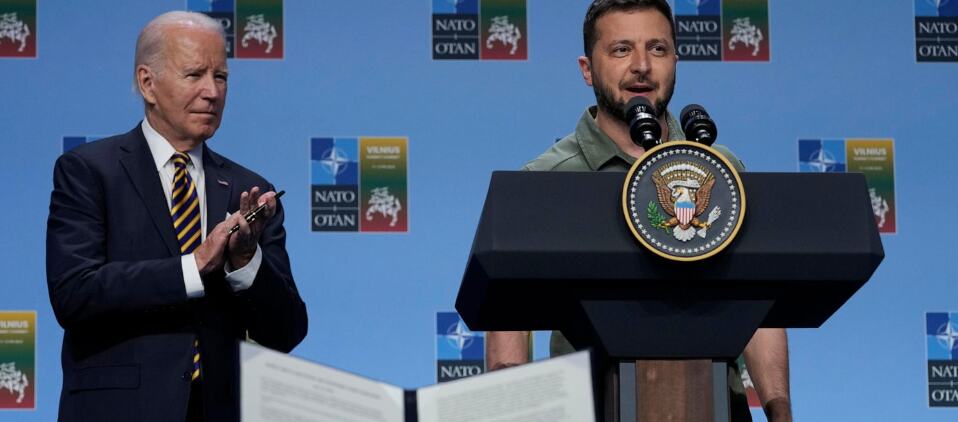Balancing Act: NATO’s Delicate Support for Ukraine
Ukraine’s President Volodymyr Zelenskyy welcomed a new commitment of weapons and ammunition to fight Russia’s invasion, but expressed disappointment that there was no clear path for the country to join NATO.
Ukraine’s President Volodymyr Zelenskyy welcomed a new commitment of weapons and ammunition to fight Russia’s invasion, but expressed disappointment that there was no clear path for the country to join NATO.
A joint declaration by the G-7 lays the groundwork for each nation to negotiate agreements to help Ukraine bolster its military over the long term. NATO leaders launched a new forum for deepening ties with Ukraine, known as the NATO-Ukraine Council, which is intended to serve as a permanent body where the alliance’s 31 members and Ukraine can hold consultations and call for meetings in emergency situations.
The summit’s communique said Ukraine can join “when allies agree and conditions are met”, but NATO Secretary-General Jens Stoltenberg said the alliance needs Ukraine just as much as Ukraine needs NATO.
Latvian Prime Minister Krisjanis Karins added that “at the end of it, what everyone gets, including Ukraine, and what Moscow sees is we are all very united.” Symbols of support for Ukraine are common in Vilnius, where the country’s flags hang from buildings and are pasted inside windows.
However, there have been concerns about the country’s democracy and corruption being too deeply rooted. Under Article 5 of the NATO charter, members are obligated to defend each other from attack, which could draw other nations into direct fighting with Russia.
British Defence Secretary Ben Wallace warned of frustration over Mr. Zelenskyy’s demands, saying “people want to see gratitude” for the Western military support.
The G-7 framework would include long-term commitments to Ukraine’s security, and the British Foreign Ministry said it marks the first time that this many countries have agreed to a “comprehensive long-term security arrangement of this kind with another country.” Moscow reacted harshly to the G7 plan, with Kremlin spokesman Dmitry Peskov saying “we consider this extremely ill-judged and potentially very dangerous.”
This year’s summit has seen a movement between conflict and compromise, with Turkey unexpectedly agreeing to drop its objections to Sweden’s bid for membership in the alliance. Ukraine is looking to NATO for more than just military support.
Although international summits are often tightly scripted, this one in Vilnius has seen a call for gratitude, with British Prime Minister Rishi Sunak saying that supporting Ukraine “will send a strong signal to President Putin and return peace to Europe.”




